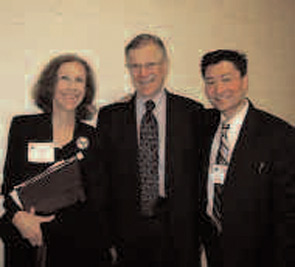“By tomorrow night, there will be so many more people on Capitol Hill who know—and are sensitive to—rheumatology and the issues that impact you and your patients. There is no substitute for what you are doing,” says Martha M. Kendrick, a partner at Patton Boggs, LLP, the ACR’s lobbying firm. This is what she told the physician, health professional, and patient participants of the ACR’s 2008 “Advocates for Arthritis” advocacy event—termed a fly-in—before they took their personal stories to the lawmakers on Capitol Hill.
Over 150 advocates participated in 225 meetings during the February Washington, D.C., fly-in. However, numbers cannot fully demonstrate the power of constituents speaking with their lawmakers. It is an effort that affects laws and decision-making in ways that extend past the traditional benchmarks of success.
“An association can successfully lobby lawmakers to a certain extent. It is when constituents call, write, and show up that lawmakers really take notice,” says Kristin Wormley, the ACR government affairs director. “The February ‘Advocates for Arthritis’ fly-in was one of those times when lawmakers took notice of the issues affecting the rheumatology community.”
The fly-in began with a day of preparation where advocates were trained by Patton Boggs. In addition to the training, participants were briefed on both the Senate and House perspectives of the issues affecting rheumatology by Billy Wynne, counsel on the Senate Finance Committee Health and Welfare Team, and Nick Shipley, legislative director to Rep. Jay Inslee (R-Wash.).
Stephen Katz, MD, PhD, director of the National Institute of Arthritis and Musculoskeletal and Skin Diseases, and William Rogers, MD, medical officer of the Office of the Director of the Physicians Regulatory Issues Team at the Centers for Medicare & Medicaid Services (CMS), gave participants an overview of the current issues coming out of their institutions.
To give participants an overview of the legislative issues affecting the entire medical community, Todd Askew, director of congressional affairs at the American Medical Association, reviewed the Sustainable Growth Rate (SGR), dual energy X-ray absorptiometry, and other important topics with participants.
The advocacy training ended with Rep. Shelley Berkley (D-Nev.) offering her advice for advocates as they head to the Hill. Rep. Berkley immediately won the crowd over by announcing that, at the age of 47, she married a physician. She told a story of her husband asking her to test his new bone density scanner on one of their first dates. “After five minutes, a technician came in the room and told me I have osteoporosis,” says Rep. Berkley. “I realized shortly after that, he had done that deliberately.” Her husband—Dr. Larry, as she calls him—had suspected that Rep. Berkley had osteoporosis, and used his new bone density scan to “accidentally” stumble on a diagnosis. By the end of her address, it was obvious that Rep. Berkley not only understands the issues affecting rheumatology, but that she is also directly touched both as a patient and a physician’s wife.

On the second day of the fly-in, advocates loaded buses and flooded the steps of Capitol Hill—all wearing “No SGR” stickers to provide a visual aid for their meetings. Advocates representing 34 states met with their lawmakers to ask for their support of the four main issues affecting rheumatologists and their patients:
- A long-term solution to the flawed physician reimbursement formula: Lawmakers were told that physicians should be paid based on increases to the cost of practicing medicine and were asked to base physician payments on the Medical Economic Index and eliminate the SGR formula.
- The Medicare Fracture Prevention and Osteoporosis Testing Act of 2007: Lawmakers were encouraged to sign on in support of this legislation, which restores funding that is vital to preventative service in healthcare.
- The Arthritis Prevention, Control, and Cure Act of 2007: Lawmakers were asked to support this legislation, which would expand efforts to discover and implement new ways of preventing, treating, and caring for patients with arthritis and related rheumatic diseases.
- Support for arthritis and rheumatic disease research by increasing NIH funding: Lawmakers were asked to increase funding to federal programs engaged in vital research to combat arthritis and related diseases, which are essential to continuing the search for innovative treatments that can help millions of Americans live longer, healthier, and more productive lives.
By all accounts, the “Advocates for Arthritis” fly-in was a successful lobbying effort on behalf of the ACR and ARHP. Several lawmakers have taken immediate action in response to the February Hill visits, and participants felt like their message was heard. “Advocacy on the Hill was amazing,” says fly-in participant Barry Waters, MD. “The lectures were fantastic and the experience of lobbying was exhilarating. It was a perfectly assembled program and every ACR member should try to find time to participate in a future event. Sincerely, it was one of the highlights of my career as a rheumatologist.”
Outside of the effect the fly-in had on legislation, this year’s event was a success within the ACR by showing members to be passionate and willing to reach out on behalf of the rheumatology community. “It is certainly difficult to judge the success and impact we have on Congress, as it takes time for legislation to move,” explains ACR Government Affairs Specialist, Aiken Hackett. “More than tripling the event’s attendance in a two-year span is evidence that ACR and ARHP members are willing to get involved in advocacy activities and speak out on issues that affect them and their patients. This is the true success of this year’s fly-in.”
All ACR and ARHP members are encouraged to advocate on behalf of themselves and their patients year-round. The best way to begin your advocacy efforts is by visiting the ACR legislative action center at www.capwiz.com/acr.
For more information about “Advocates for Arthritis” or advocacy issues, contact Aiken Hackett or Kristin Wormley at (404) 633-3777, or [email protected] and [email protected], respectively.
